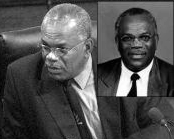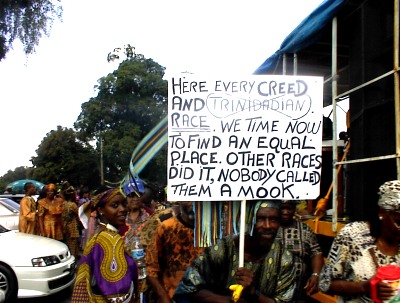|
The URL for this article is:
www.rastaspeaks.com/tyehimba/2004/1308.html
Illusions of Emancipation
By Tyehimba
August 13, 2004
While listening to a radio talk show programme, I heard the hosts advocate that Trinidad and Tobago should abolish certain holidays, as they were causing divisions in society. Of course the holidays they advocated that should be abolished were Indian Arrival Day and Emancipation Day. But how can Emancipation Day, Indian Arrival Day or the discussion of African issues be dividing a society that was never united in the first place?
Of course, whenever someone talks about African issues, many find that such issues are divisive, and should not be discussed. We should realize however, that the discussion of African issues does not negate the existence of other groups. It is quite possible to talk about issues from an African perspective and be fair to all other groups. Then there is the issue of Indian Arrival Day, which the 'enlightened' talk show hosts said should be renamed Arrival Day to include everybody. This in itself shows why people need to revisit history: Africans have nothing in their arrival to the Caribbean to celebrate.
More than 500 years have passed since the first slave ship named the SS Jesus Christ of Lubeck, commandeered by a Christian priest, sailed to the West Indies carrying its first load of African captives. For many years after, enslaved Africans would sing songs asking Jesus Christ (the ship) to take them back home. The recent Emancipation Day celebrations two weeks ago marked the freedom of enslaved Africans from the physical shackles of European bondage. Emancipation time in Trinidad and Tobago, once again has come and gone, and those that eagerly plunged into the fleeting concept of Emancipation and swum in the sea of false consciousness are nowhere to be found. They seem to be content with being 'emancipated' a couple of days for the year and being in chains for the remaining 363 days of the year.

T&T Govt Minister, Ken Valley
Ken Valley said, "me ent no African nuh." He further described wearing traditional African clothing as looking like a "mook".
| |
Generally, the only time that African issues are discussed in the mainstream is around Emancipation time, and even so, the perspectives are often very limited and narrow minded, and fail to capture and express the deepest experiences of Africans in the Diaspora. As a result the many distorted ideas that people have about certain issues remain unaddressed. It is ironic that Minister Ken Valley (like many others) could quote Bob Marley's clichéd line 'emancipate yourself from mental slavery' yet in the same breath exhibit ignorance that could only come from deep mental bondage. Ken Valley and many others in their haste to distance themselves from anything African get confused between nationality and race (or ethnicity). 'Trinidadian' denotes nationality, which is related to the geographical identification of an individual, whereas race denotes the inherited physical characteristics or phenotype of a group of people. Nationality can be changed, whereas race is fixed. Race is a primary characteristic as it can be seen automatically, whereas there is no way to know someone's nationality without being told. Furthermore, a person can be African, and also Trinidadian. The two do not contradict each other. Valley's emancipation comments should not be looked at in a vacuum, as they are reflective of the ignorance within the wider society. While Valley is responsible for his own ignorance, what must be examined is the failure of education and other socialization mechanisms to address the effects of colonialism on the minds of the colonized.
It is these 'house Negro' attitudes shown by Minister Valley that render many Africans unable to understand and even be oblivious to what is happening in Haiti, Sudan and other places around the world.
The real significance of Emancipation seems to be lost to the many seasonal Africans who around Emancipation time unpack their African garments from the back of their cupboards and rush to the Emancipation village to parade themselves. The success of the Emancipation Day for many seems to be how many people can turn up at the Emancipation village in African wear. As I remarked to someone in a similar discussion, a million people walking around in African wear does not mean that any of them have reached a level of consciousness to understand the deeper issues of life. The temporary one day celebration of emancipation while it may have its role in the scheme of things, obscures the fact although more than 150 years have passed since emancipation from chattel slavery, people are not free from the shackles of European domination and the need for foreign (white) acceptance.
The Africans who have attained high social and occupational positions are not good reflections of African empowerment; as to gain upward mobility into the elite often means conforming to the status quo that exudes hostility towards authentic African voices. African people are yet to reclaim the best of the wisdom of the ancestors. The effects of more than 500 years of European domination and control of media, religion and education has not been properly addressed in the mainstream, and as a result many remain trapped in a state of self delusion. Colonial constructs, biases and stereotypes still inform the way people think, behave and interact with each other. While traditional African wear is very beautiful, it does not compensate for the lack of self-understanding displayed by many. However, it should be recognized that the lack of strong African voices in the mainstream has meant that the path towards a greater understanding of self is not readily apparent.
To the Africans brought to the West Indies and their descendants, the processes of slavery and colonialism acted to dehumanize and dispossess them in every possible way. The dispossession of African languages, names, culture and religious beliefs coupled with the horrendous physical torture caused psychological trauma that can be seen in the patterns of thought and behavior of descendants of enslaved Africans. One instance of torture occurred when the slave masters took a pregnant slave, in the presence of other slaves and slit open her stomach, took out the child and killed it to inculcate fear into the slaves. The process of European chattel slavery was very brutal and the effects are clearly with us to this day, but an important often ignored area of history is the processes and effects of Arabic/Islamic enslavement of Africans that started earlier and was every bit as brutal as the European Slave trade. This is an article for another time, but it is important to note that it was not only Euro-Christians that brought destruction to Africa and Africans but Muslim Arabs penetrating from north of Africa.
The identity crisis of many Africans is an inevitable result of existing and being conditioned in a society, which because of the nature of its development, is deeply anti-African. The poor attitudes that the colonial ruling class had about Blacks became imbedded in social institutions and processes, as well being internalized by Blacks themselves. East Indians have no problem identifying themselves as such, and similarly no one shouts 'divisiveness' if a Chinese person proudly identifies themselves as such. However, bombarded by poor attitudes towards Africa and Africans, the uninformed African tries to distance him/herself from any concept of African identity and seeks solace in illusionary concepts of 'Trinbagonianess', one love, or 'no race'. Africa is seen as a primitive dark continent peopled by backward, inferior, pagan savages, who lack the ability to look after their own affairs. The view in the mainstream is that Africa is a cultureless uncivilized place, where the light of (European) civilization has never properly shone. Thus Africans will more readily identify themselves as Negroes or Black, rather than Africans. Few realize how offensive the word Negro is. Given that the word Negro came from the Greek word 'necro' meaning dead, it may be an apt title for those that refer to themselves as such.
Though scholars and researchers have exposed mountains of evidence that show Africa to be the birthplace of mathematics, astronomy, music, medicine, science, yoga, martial arts, philosophy, engineering and architecture, much of this information has not yet been accepted in the mainstream media and the education system. For instance, the Ishango Bone (dated approx 25 thousands years old), the second oldest mathematical specimen, which was found in the Congo, central Africa, showed a number system to the base ten, familiarity with multiplication/duplication and prime numbers. History is a necessary tool in countering the Eurocentric indoctrination that many including the 'best' of our so-called leaders so staunchly hold on to and promote. It is necessary to understand the processes of slavery and colonialism, but it is also very important to understand certain critical pre-slavery historical processes. If such was available in the mainstream education system, we could have better informed leaders who could in turn make far better choices in carrying out their duties.
Another illusion has to do with the narrow interpretation of African culture. African culture is seen as merely art and entertainment- African singing, dancing, and playing drums. This parochial conceptualization of African culture totally ignores the ideas, values and principles that underlie the African way of life. It is the history, ideas and philosophy of a people that allows the entertainment and artistic aspects of culture to be put in its proper context. However, the mainstream media feels comfortable facilitating the entertainment (non threatening) aspects of African culture such as drumming and singing, but is less likely to accommodate serious African perspectives. The Eurocentric, male-dominated comfort zone, which many operate in, is filled with colonial assumptions, stereotypes, biases and false privileges that are inherently hostile and disrespectful to perspectives that run contrary to the norm.
Despite the temporary nature of the Emancipation celebrations, and the fact that many identify only with the externals, it still has its role to play in the scheme of things. People will however be able to identify fully with the best of the collective wisdom of Africa, when more informed and experienced African voices are able to articulate themselves freely in the mainstream media. The true freedom that can come through assimilation of this wisdom is 365-day work.
The problems and patterns (including Valley's identity crisis) that exist in our society today is not that people are aware of history but rather that they are ignorant about it. The history of colonialism is not only relevant to those that are identified as Africans, but to other groups as well, as colonialism is largely responsible for the for the ways in which different socio-economic and racial groups interact with each other. People can look at their own personal conduct and examine how they are chained by their poor attitudes, insecurities and false privileges. Furthermore, they can look at how they contribute to the continuance of a system that deals the worst to the Blackest of Black Africans. Incidentally, those that think themselves free may have the most work to do despite the best of intentions.
|  |








